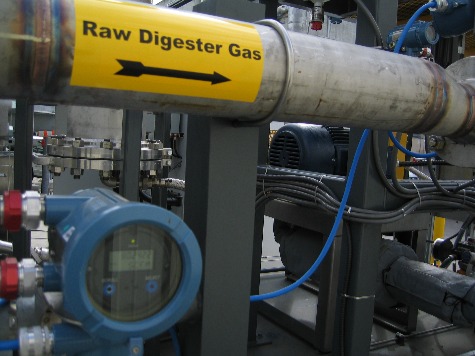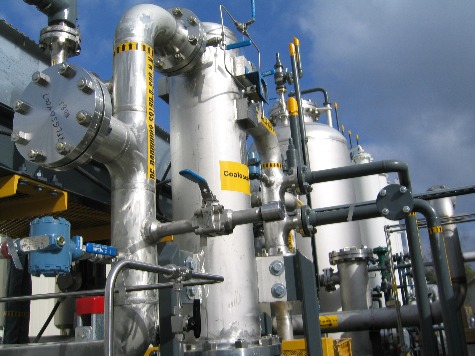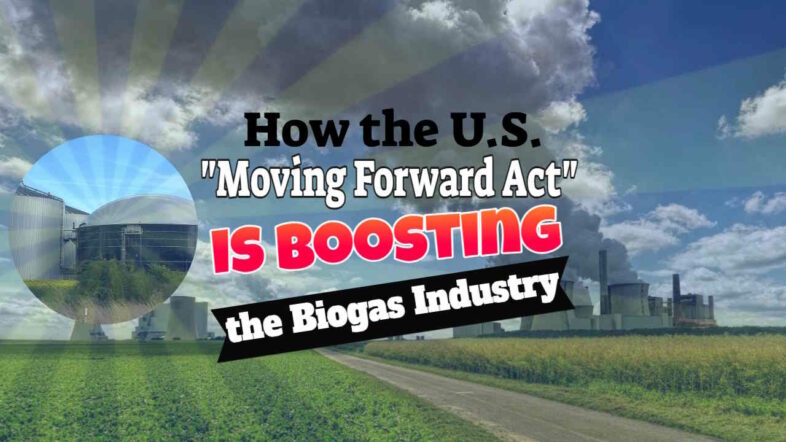The Moving Forward Act, passed by the US House of Representatives in 2020, is a comprehensive infrastructure package aimed at boosting sustainable technologies and creating new jobs. The act includes provisions that specifically support the biogas industry, which has the potential to reduce greenhouse gas emissions and create renewable energy.
In this updated article, we will explore how the Moving Forward Act has and still does, support the United States biogas industry and what benefits this will be bringing to the environment and the economy.
Anaerobic Digestion and Biogas/ Biomethane in the U.S.
The anaerobic digestion and biogas industry is an emerging sector that utilizes organic waste to produce renewable energy.
This industry has significant potential for growth in the US, with the potential to reduce greenhouse gas emissions, create renewable energy, and create new jobs.
The US Moving Forward Act is a comprehensive infrastructure package that includes provisions that specifically support the biogas industry.
These provisions aim to promote renewable energy and reduce carbon emissions from waste management practices. In this article, we will explore how the Moving Forward Act supports the biogas industry and what benefits this could bring to the environment and the economy.
The Moving Forward Act along with the RECYCLE Act of 2021 S.923 are now providing tax breaks and subsidies to promote the development of the American biogas industry. As a result, coupled with a rising public awareness of climate change and the necessity for green fuels investment is rapidly growing in the technology across the US.
US Government (Under Democratic Party Control) is Supporting the US Biogas Industry
The Moving Forward Act includes several provisions that aim to support the biogas industry. One key provision is the RECYCLE Act, which aims to promote anaerobic digestion, a process that converts organic waste into biogas, through grants and technical assistance programs.
The act also includes provisions that support the installation of biogas systems in agricultural operations and municipal wastewater treatment plants. Additionally, the Moving Forward Act provides funding for research into biogas technology, which could lead to further advancements in this field.
Environmental Benefits of the Adoption of Anaerobic Digestion Process Technology
The biogas industry has significant potential for reducing greenhouse gas emissions. Organic waste that is not treated properly, such as through anaerobic digestion, can produce methane, a potent greenhouse gas.
By utilizing anaerobic digestion, the biogas industry can capture this methane and use it to produce renewable energy, thereby reducing greenhouse gas emissions. Furthermore, anaerobic digestion can also reduce the release of other harmful pollutants, such as nitrogen and phosphorous, from organic waste.
Economic Benefits of the Adoption of Anaerobic Digestion Process Technology
By supporting the biogas industry, the Moving Forward Act is thought to create new jobs and promote economic growth.
According to the American Biogas Council, the biogas industry currently supports over 23,000 jobs in the US, and the potential exists for this number to double by 2030. Furthermore, the use of biogas as a renewable energy source could reduce the US dependence on foreign oil, leading to increased energy independence.
Conclusion
The Moving Forward Act represents a significant step forward in promoting sustainable technologies and reducing greenhouse gas emissions. By specifically supporting the biogas industry, the act has the potential to create new jobs, reduce greenhouse gas emissions, and promote economic growth.
However, it is important to note that the success of the biogas industry will depend on many factors, including the availability of organic waste and the cost-effectiveness of biogas production.
Nonetheless, the provisions in the Moving Forward Act represent a significant opportunity for the biogas industry to play a larger role in the transition to a more sustainable and resilient economy.
The following is the original archived post on this page, published on 23 June 3020, it explained how the Act which subsequently became law as part of a nationwide plan to Rebuild American Infrastructure after COVID-19. Read on for a snapshot of those covid stressed times:
US Moving Forward Act Can Boost Biogas Industry in $1.5 Trillion Plan to Rebuild American Infrastructure
As part of the COVID-19 recovery, the US Moving Forward Act has been published amid the welcome news that, if passed by the House of Representatives, the act would at long last, bring support for the US biogas industry in line with the sort of tax incentive support which has long been available to some other renewable energy sources.
This would boost the US Biogas Industry as part of the $1.5 trillion plan to Rebuild American Infrastructure after COVID-19.
Read more in the PR published below:
American Biogas Council Press Release 23 June 2020 (Washington):
Moving Forward Act Can Boost Biogas Industry

The American Biogas Council (ABC) praised the release of the long-awaited infrastructure package by the U.S. House of Representatives entitled, The Moving Forward Act (H.R.2). The $1.5 trillion proposal to rebuild U.S. communities with infrastructure and innovation includes several tax provisions on which the ABC has long labored, to create a more equitable environment where natural market forces can work to build more biogas systems. Because the biogas industry intersects with so many sectors of our economy, when the Moving Forward Act helps boost the biogas industry, it will also surge growth in agriculture, wastewater and municipal recycling infrastructure, access to more renewable energy, and more.
Biogas systems recycle organic material into renewable energy and soil products using a natural microbial process called anaerobic digestion. Currently, the US has 2,000 operational biogas systems, and the potential to build nearly 15,000 new biogas systems. If fully realized, these new biogas systems will directly catalyze at least $45 billion in capital deployment which would result in approximately 374,000 short-term construction jobs to build the new systems and 25,000 permanent jobs to operate them. Indirect impacts along supply chains would be even greater.
“The American Biogas Council (ABC) thanks the House for responding to our requests to create more parity in our tax code. The Moving Forward Act can create an environment where the biogas industry can create billions of dollars of new investments to build new recycling and renewable energy infrastructure and simultaneously protecting our air, water, and soil,”
said Patrick Serfass, Executive Director of the ABC.
“The biogas industry plays one of the most underappreciated roles in the renewable energy industry, creating your choice of non-stop renewable electricity, gas, and/or heat, plus natural soil products from recycled organic waste.”

In particular, the Moving Forward Act includes three tax provisions of importance to the ABC including the creation of:
- an investment tax credit (ITC) for RNG and heat-based biogas systems; the extension of the Section 45 production tax credit (PTC), and related ITC, for electricity-biogas systems; and
- the extension of the Alternative Fuel Excise Tax Credit for biogas and renewable natural gas used as a vehicle fuel.
Furthermore, the bill also recognizes the volatility caused in tax equity markets by the coronavirus and establishes an elective payment for those entities utilizing the PTC or ITC.
Without the Moving Forward Act, the US tax code only supports a sector of the biogas industry which has rarely benefited from a tax credit extended into the future which would enable developers and investors to build more new projects.
During these times, other renewable and fossil energy technologies have often benefited from long extensions of their tax credits impacting their entire industry and accelerating growth in those sectors while making it difficult for others to obtain financing.
The Moving Forward Act takes a major step towards correcting many of those inequities.
Related resources:
H.R. 2 – The Moving Forward Act: Section by Section | Bill Text | Fact Sheet
The American Biogas Council is the only national trade association representing the entire biogas industry in the U.S. We represent over 200 companies in all parts of the biogas supply chain that are dedicated to maximizing the production and use of biogas from organic waste.
[Article originally posted on 23 June 2020.]







